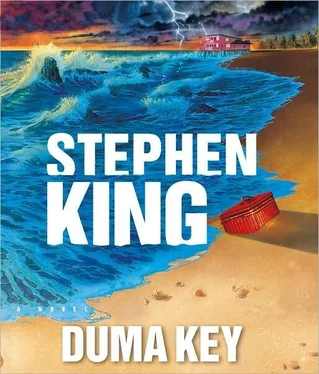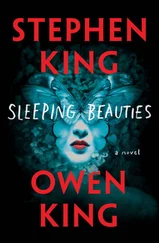“Ilse!” I shouted. “Ilse!”
Wireman stood up fast, bumping his hip against the side of the sink. He raised his open hands to me. I shook my head — Don’t know. Now I could feel sweat running down my cheeks, although the kitchen wasn’t particularly warm.
I was wondering what to do next — who to call — when Ilse came back on the phone. She sounded exhausted. She also sounded like herself. Finally like herself. “Jesus Christ in the morning,” she said.
“What happened?” I had to restrain myself from shouting. “Illy, what happened? ”
“It’s gone. It caught fire and burned. I watched it through the window. It’s nothing but ashes. I have to get a Band-Aid on the back of my hand, Dad. You were right. There was something really, really wrong with it.” She laughed shakily. “Damn thing didn’t want to go in. It folded itself over and…” That shaky laugh again. “I’d call it a paper-cut, but it doesn’t look like a paper-cut, and it didn’t feel like one. It feels like a bite. I think it bit me.”
The important thing for me was that she was all right. The important thing for her was that I was. We were fine. Or so the foolish artist thought. I told her I’d call tomorrow.
“Illy? One more thing.”
“Yes, Dad.” She sounded totally awake and in charge of herself again.
“Go to the stove. Is there an oven light?”
“Yes.”
“Turn it on. Tell me what you see.”
“You’ll have to hold on, then — the cordless is in the bedroom.”
There was another pause, shorter. Then she came back and said, “Ashes.”
“Good,” I said.
“Daddy, what about the rest of your pictures? Are they all like this one?”
“I’m taking care of it, honey. It’s a story for another day.”
“All right. Thank you, Daddy. You’re still my hero. I love you.”
“I love you, too.”
That was the last time we spoke, and neither of us knew. We never know, do we? At least we ended by exchanging our love. I have that. It’s not much, but it’s something. Others have it worse. I tell myself that on the long nights when I can’t sleep.
Others have it worse.
I slumped down across from Wireman and propped my head on my hand. “I’m sweating like a pig.”
“Busting Miss Eastlake’s sink might’ve had something to do with that.”
“I’m sor—”
“Say it again and I’ll smack you,” he said. “You did fine. It’s not every man who gets to save his daughter’s life. Believe me when I say that I envy you. Do you want a beer?”
“I’d throw it up all over the table. Got milk?”
He checked the fridge. “No milk, but we are go for Half-n-Half.”
“Give me a shot of that.”
“You’re a sick, sick puppydick, Edgar.” But he gave me a shot of Half-n-Half in a juice glass, and I tossed it off. Then we went back upstairs, moving slowly, clutching our stubby silver-tipped arrows like aging jungle warriors.
I went back into the guest bedroom, lay down, and once more gazed up at the ceiling. My hand hurt, but that was okay. She’d cut hers; I’d cut mine. It fit, somehow.
The table is leaking, I thought.
Drown her to sleep, I thought.
And something else — Elizabeth had said something else, as well. Before I could remember what it was, I remembered something much more important: Ilse had burned The End of the Game in her gas oven and had suffered no more than a cut — or maybe a bite — on the back of her hand.
Should have told her to disinfect that, I thought. Should disinfect mine, too.
I slept. And this time there was no giant dream-frog to warn me.
A thud woke me as the sun was rising. The wind was still up — higher than ever — and it had blown one of Wireman’s beach chairs against the side of the house. Or maybe the gay umbrella beneath which we had shared our first drink — iced green tea, very cooling.
I pulled on my jeans and left everything else lying on the floor, including the harpoon with the silver tip. I didn’t think Emery Paulson would be back to visit me, not by daylight. I checked on Wireman, but that was only a formality; I could hear him snoring and whistling away. He was once more on his back, arms thrown wide.
I went downstairs to the kitchen and shook my head over the broken faucet and the juice glass with the dried Half-n-Half scum on its sides. I found a bigger glass in a cupboard and filled it with oj. I took it out on the back porch. The wind blowing in from the Gulf was strong but warm, lifting my sweaty hair back from my brow and temples. It felt good. Soothing. I decided to walk to the beach and drink my juice there.
I stopped three-quarters of the way down the boardwalk, about to take a sip of my juice. The glass was tipped, and some of it splattered on one bare foot. I barely noticed.
Out there on the Gulf, riding in toward shore on one of the large, wind-driven waves, was a bright green tennis ball.
It means nothing, I told myself, but that wouldn’t hold water. It meant everything, and I knew it from the moment I saw it. I tossed the glass into the sea oats and broke into a lunging lurch — the Edgar Freemantle version of running that year.
It took me fifteen seconds to reach the end of the boardwalk, maybe even less, but in that time I saw three more tennis balls floating in on the tide. Then six, then eight. Most were off to my right — to the north.
I wasn’t watching where I was going and plunged off the end of the boardwalk into thin air, arms whirling. I hit the sand still running and might have stayed up if I’d landed on my good leg, but I didn’t. A zigzag of pain corkscrewed up my bad one, shin to knee to hip, and I went sprawling in the sand. Six inches in front of my nose was one of those damned tennis balls, its fuzz soaked flat.
DUNLOP was printed on the side, the letters as black as damnation.
I struggled to my feet, looking wildly out at the Gulf. There were only a few incoming balls in front of El Palacio, but farther north, near Big Pink, I saw a green flotilla — a hundred at least, probably many more.
It means nothing. She’s safe. She burned the picture and she’s asleep in her apartment a thousand miles from here, safe and sound.
“It means nothing, ” I said, but now the wind blowing my hair back felt cold instead of warm. I began to limp toward Big Pink, down where the sand was wet and packed and shining. The peeps flew up in front of me in clouds. Every now and then an incoming wave would drop a tennis ball at my feet. There were lots of them now, scattered on the wet hardpack. Then I came to a burst-open crate reading Dunlop Tennis Balls and FACTORY REJECTS NO CANS . It was surrounded by floating, bobbing tennis balls.
I broke into a run.
I unlocked the door and left my keys hanging in the lock. Lurched to the phone and saw the message light blinking. I pushed the PLAY button. The robot’s expressionless male voice told me that this message had been received at 6:48 AM, which meant I had missed it by less than half an hour. Then Pam’s voice burst out of the speaker. I bent my head, the way you’d bend your head to try and keep a burst of jagged glass fragments from flying directly into your face.
“Edgar, the police called and they say Illy’s dead! They say a woman named Mary Ire came to her apartment and killed her! One of your friends ! One of your art friends from Florida has killed our daughter !” She burst into a storm of harsh and ugly weeping… then laughed. It was horrible, that laugh. I felt as if one of those flying shards of glass had cut into my face. “Call me, you bastard. Call and explain yourself . You said she’d be SAFE! ”
Читать дальше










